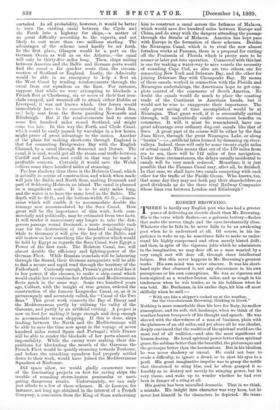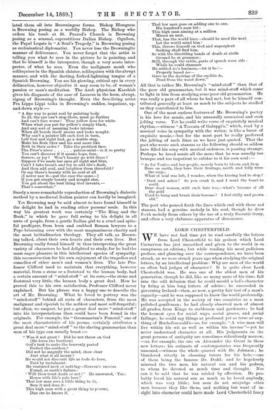ROBERT BROWNING.
THERE is hardly any English poet who has had a greater power of delivering an electric shock than Mr. Browning. His is the verse which flashes—as a galvanic battery—flashes that make the nerves tingle and the eyes involuntarily close. Whatever else he fails in, he never fails to be an awakening poet when he is understood at all. Of course, in his im- patience to wake us up, he sometimes fails to make us under- stand his highly compressed and often merely hinted drift; and then, in spite of the vigorous jolts which he administers to the imagination, we may doze off, as a man wearied by a very rough cart will doze off, through sheer intellectual fatigue. But this never happens in Mr. Browning's greatest works. His own mind war never obscure. It was his short- hand style that obscured it, not any obscureness in his own perceptions or his own conceptions. He was as vigorous and keen-sighted as a weather-beaten sailor, and as rough in his tenderness when he was tender, as in his boldness when he was bold. Mr. Buchanan, in his earlier days, hit him off most skilfully when he said :—
" With eye like a skipper's cocked up at the weather,
Sat the vice-chairman Browning, thinking in Greek." Nothing is more remarkable than his love for Italy, its mellow atmosphere, and its soft, rich landscape, when we think of the weather-beaten brusquerie of his thought and speech. He was shrewd with the shrewdness of a man of business, plain with the plainness of an old sailor, and yet above all he was idealist, deeply convinced that the realities of the spiritual world are the most real of all realities,—and also the most significant of human destiny. He loved spiritual power better than spiritual grace, the sublime better than the beautiful, the picturesque and the grotesque better than the harmonious. But in his idealism he was never shadowy or unreal. He could not bear to evade a difficulty, to ignore a dread, or to shut his eyes to a peril. His great imaginative impulse was to grasp the nettle that threatened to sting him, and he often grasped it so forcibly as to destroy not merely its stinging power, but its very tissue, and wake up to wonder whether he had ever been in danger of a sting at all.
His geziins has been miscalled dramatic. That is, we think,
a mistake. His insight into character was very keen, but he never lost himself in the characters he depicted. He trans -
lated Ahem all- into Browningese forms, Bishop. Blongram is Browning posing as a worldly Bishop. The Bishop who orders his tomb at St. Praxed's Church is Browning posing as a sensual, superstitious Italian Bishop. Ogniben, tfie.Papal Legate in "A Soul's Tragedy," is Browning posing as ecclesiastical diplomatist. You never lose the Browningite manner of deliverance. You never forget that the artist is
telling you what he sees in the picture he is painting, and that he himself is the interpreter, though a very acute inter-
preter, of what he sees. Even the malignant monk who soliloquises in the Spanish cloister, soliloquises with the abrupt manner, and with the darting, forked-lightning tongue of a Spanish Browning. You see his piercing, critical eye in every delineation, however objective it may seem to be, of woman's passion or man's meditation. The Arab physician Karshish gives his diagnosis of the case of Lazarus in the keen, abrupt, zigzag of Browning's thought. Even the free-living artist Fra Lippo Lippi talks in Browning's sudden, impatient, up- and-down style :-
" A fine way to paint soul by painting body So ill, the eye can't stop there, must go further And can't fare worse ! Thus yellow does for white When what you put for yellow's simply black, And any sort of meaning looks intense When all beside itself means and looks nought. Why can't a painter lift each foot in turn, Left foot and right foot, go a double step, Make his flesh liker and his soul more like Both in their order ? Take the prettiest face.
The Prior's niece patron-saint—is it so pretty You can't discover if it means hope, fear,
Sorrow, or joy ? Won't beauty go with these ?
Suppose I've made her eyes all right and blue, Can't I take breath and try to add life's flash, And then add soul, and heighten them threefold?
Or say there's beauty with no soul at all (I never saw it—put the case the same—) If you get simple beauty and nought else,
You get about the best thing God invents,—
That's somewhat."
Surely a more remarkable reproduction of Browning's dialectic method by a mediaeval Italian painter can hardly be imagined.
Yet Browning may be said almost to have found himself in the delight he had in reading other persons' souls. In this
way his greatest work was certainly " The Ring and the Book," in which he gave full swing to his delight in all sorts of people, from a gentle Italian girl to a cruel and spite- ful profligate, from keen and crabbed Roman lawyers to a Pope brimming over with the most magnanimous charity and the most latitudinarian theology. They all talk, as Brown- ing talked, about their own hearts and their own lives. But Browning really found himself in thus interpreting the great variety of characters he had delighted to study, for he had the
most eager pleasure in this intellectual species of sympathy, this reconstruction for his own enjoyment of the tragedies and comedies of other men's and women's lives. The late Pro- fessor Clifford used to maintain that everything, however material, from a stone or a footstool to the human body, had a certain amount of " mind-stuff " at its core,—the stone and footstool very little, the human body a great deal. How he proved this to his own satisfaction, Professor Clifford never explained. But his phrase was a happy one to describe the art of Mr. Browning. What he loved to portray was the " mind-stuff " behind all sorts of characters, from the most malignant and viperish to the noblest and most self-forgetful ; but often, we suspect, he put a great deal more " mind-stuff " into his interpretations than could have been found in the originals. For example, his " Grammarian's Funeral," one of the most characteristic of his poems, certainly attributes a great deal more " mind-stuff " to the slaving grammarian than men of his type can usually boast :— " Was it not great ? Did he not throw on God
(He Wes the burthen)
God's task to make the heavenly period Perfect the earthen ?
Did not he magnify the mind, show clear Just what it all meant ?
He would not discount life as fools do here, Paid by instalment.
He ventured neck or nothing—Heaven's success Found, or earth's failure : Wilt thou trust death or not ? ' He answered, ' Yes; Hence with life's pale lure !'
That low man sees a little thing to do, Sees it and does it :
This high man with a great thing to pursue,
Dies ere he knows it. ,
. That low man goes on adding one to one,
His hundred's soon hit : This high man aiming at a million Misses an unit.
That, has the world here—should he need the next Let the world mind him !
This, throws himself on God and unperplext Seeking shall find him. So with the throttling hands of death at strife Ground he at grammar; Still, through the rattle, parts of speech were rife : While he could stammer
He settled Or I's business,—let it be !- Properly based due— Gave us the doctrine of the enclitic Se,
Dead from the waist down."
All that is rather Mr. Browning's " mind-stuff " than that of the poor old grammarian, but it was mind-stuff which came to light in him from studying some poor old grammarian. He was really a part of all whom he had met, but he himself con- tributed generally at least as much to the subjects he studied as they contributed to him.
One of the most curious features of Mr. Browning's poetry is his love for music, and his unusually unmusical and even jolting verse. Yet he could write verse of exquisitely musical rhythm,—witness "A Toccata of Galuppi's," which, read by a musical voice in sympathy with the writer, is like a burst of exquisite music,—but for the most part he really preferred the jolting of such lines as we have just quoted. That the poet who wrote such stanzas as the following should so seldom have filled his song with musical cadences, is passing strange. Perhaps he loved music all the more that he was usually too, brusque and too impatient to subdue to it his own soul :— "As for Venice and her people, merely born to bloom and drop Here on earth, they bore their fruitage, mirth and folly were the crop ;
What of soul was left, I wonder, when the kissing had to stop ?
Dust and ashes!' So you creak it, and 1 want the heart to scold.
Dear dead women, with such hair too,—what's become of all the gold Used to hang and brush their bosoms ? I feel chilly and grown . old."
The poet who poured forth the lines which end with these sad stanzas, had a genuine melody in his soul, though he drew forth melody from others by the use of a truly Socratic irony, and often a very elaborate apparatus of dissonance.











































 Previous page
Previous page